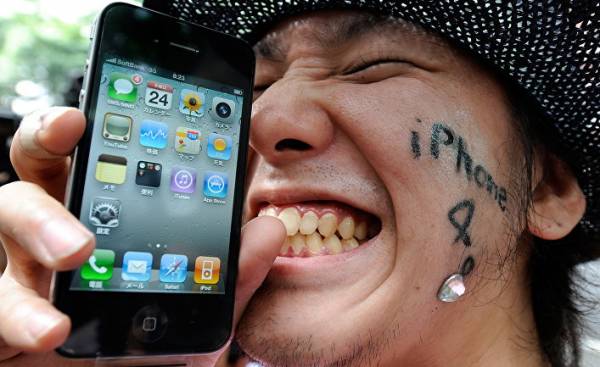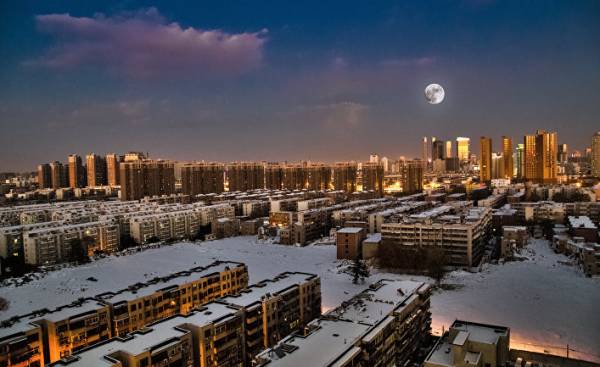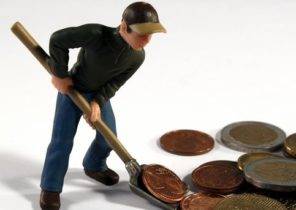
Zhengzhou, China — Farmer Zhang Hailin (Hailin Zhang) remembers the day in 2010 when he saw helicopters flying over the corn and wheat fields, and then zamirovskiy to reset balls-mark.
“Three days later hundreds of bulldozers,” says Mr. Zhang.
Came iPhone, and soon a new industrial city on the outskirts of Zhengzhou became known as the “city iPhone.”
After a few months was elevated to brown, angular building plants connected to the transmission line, and full working buses went to technology group Foxconn, which assembles most of Apple Inc.
A year later, the Chairman of Foxconn, billionaire Terry GOU (Terry Gou) said that at the industrial complex for the Assembly of iPhone employs 100 thousand workers. According to Foxconn, today there are 250 thousand people — a number roughly equal to the population of the city of Madison in Wisconsin.
According to analysts, Foxconn, earlier known as Hon Hai Precision Industry Co, annually brings together a hundred and fifty million iPhones and 20 million iPads and other electronic devices. According to a statement by Foxconn, it provides jobs for a million people in China and beyond — this includes the southern Zhengzhou, where Foxconn has begun production of the first iPhone in complete secrecy.
 © flickr.com, Damien Thorne25, 2015. The city of Zhengzhou in China’s Henan province
© flickr.com, Damien Thorne25, 2015. The city of Zhengzhou in China’s Henan province
After Apple brought the manufacturing in Chinese cities, the success of the iPhone in the ensuing decade has fueled the emergence of China as the center of the global supply chain of electronics.
Beijing has encouraged a jump in high-tech industries, as the authorities sought to increase the value of products of factories, before producing plastic toys and clothing. This shift has changed the lives of millions of Chinese, bringing them long-awaited work, however, led to complaints from some workers in monotonous work, strict rules and tightness in company-provided housing.
The global success of iPhone has attracted the attention of the public to Apple and its suppliers. Based in Cupertino, California, company said that demands from Foxconn and other meet the “strictest standards in the industry.” According to her statement, she explained 12 millions of workers their rights, made sure that their working week does not exceed 48 hours, and offered them training courses and development of personal talents. “We require our suppliers to adhere to the same standards that adhere to themselves: they should be with respect to all of its employees”, — said the representative of the company in a statement. The approval of the Apple for the last five years working conditions and salaries among its suppliers has improved significantly.
Transfer of production in Zhengzhou followed a string of suicides in 2010 occurred at the other major plants of Foxconn iPhone production facility in China in Shenzhen, near the coast, characterized by large salaries. In response to a question from The Wall Street Journal, Foxconn explained the choice of the Zhengzhou number of reasons, including the proximity to the hometowns of the workers and the appropriate infrastructure.
“Favorable business policies and Zhengzhou government investment in the creation of strong infrastructure and production make this province attractive for our business,” said Foxconn.
Like American industrial cities a century earlier — Pullman in Illinois, Hershey, Pennsylvania, and Detroit Henry Ford — the welfare of the city iPhone is based on a single product around which revolves his entire existence.
In the city iPhone shopping, restaurants, and karaoke Lounges, some of which were founded by former workers of Foxconn, designed for the workforce of Foxconn. State statistics show a jump in electronics exports from Henan, a poor province with a population of 94 million people and its capital Zhengzhou.
Officials have welcomed the iPhone with open arms: higher Chinese authorities have approved the introduction of special economic zones at the national level, the province has invested resources in the creation and development of what later became known as the city of the iPhone.
During the race, before the release of the iPhone 7 last fall, when Foxconn suffered from a shortage of personnel, the state mining company lent her their employees. According to available online government announcements over the past years, the province has allocated local authorities a quota on the number of workers, which they must provide Foxconn.
Preparing for a leap in production before the release of new iPhone models coming in the fall, recruiters went to the villages to find work to put out posters.
“Although the government helps us in recruiting, Foxconn covers all the costs associated with hiring and training new workers,” said the company.
A recent June afternoon, before the gates of the factory speaker thundered: “We hire the cream of society. You should possess good character and hard work”.
Foxconn workers earn 1,900 yuan ($278) available in the months up to more than 4000 yuan in periods of intense production. Their earnings are small, however, most live better than if worked in agriculture. For business iPhone is an expensive choice, but because many people buy more affordable Chinese smartphones.
According to 28-year-old yuan Anglin (Yuan Yanling), she worked on the Assembly line for the Assembly of iPhone three terms, moving to a different job each time, when there were more interesting or better-paid options. Last November, she traded the uniform of Foxconn on his heels and began selling cosmetics at the nearby supermarket.
“Almost all of our customers — the workers of Foxconn,” says Ms. yuan, removing one-bedroom apartment with her husband, an employee of Foxconn, and two children.
Some of the neighbors of Ms. yuan in the same apartment complex not so satisfied with their situation: some of the displaced during the development program, complaining of inadequate compensation for their land. Zhengzhou authorities argue that the compensation was in line with national standards.
In 2013, one farmer, Xiao malai (Malai Xiao), irritated local officials protest against demolition of his house to implement the development within the industrial complex intended for the Foxconn plants. According to court documents from the trial of the officer, presumably paid employee of the complex and multiple peasants to beat up the farmer, Mr. Xiao died as a result of the beating. As an officer and participating in the beating of people were convicted of it in prison.
“We did not know about the tragic death of Xiao Small or her circumstances”, — said the representative of Apple.
Other local farmers say they paid for their land compensation significantly exceeds the money they could earn, a lifetime growing corn and wheat. Mr. Zhang watching the balls drop-markers with vertoletov in 2010, used his payment to buy two apartments. According to him, he earned more as a janitor than as a farmer.
 © flickr.com, redpolkadot17 October 2008. Conveying flowers in Zhengzhou
© flickr.com, redpolkadot17 October 2008. Conveying flowers in Zhengzhou
His wife works at Foxconn, where, until recently, worked and their son.
However, Zhengzhou covered by the concern about how long will Foxconn or Apple — need iPhone city. Last year, iPhone sales fell for the first time since its inception in 2007. According to the present people during last year’s decrease of production Prime Minister of China Li Keqiang (Li Keqiang) asked Mr. GU whether to expect growth or decline in the production of the iPhone this year.
Foxconn said that it has acquired 80% used in Zhengzhou buildings, rents the rest, and intends to continue to invest.
Anyway, the Chinese authorities believe a plant for the production of the iPhone a worthy investment, says Professor of Economics at Henan University Shi PU (Shi Pu). “Foxconn helped to train hundreds of thousands of lives in Henan people, he said. — In the future they will be able to use their skills in a different work.”
In writing this article helped Kirsten Zhang (Kersten Zhang) and Yang Jie in Beijing and Tripp Mikli in San Francisco.







